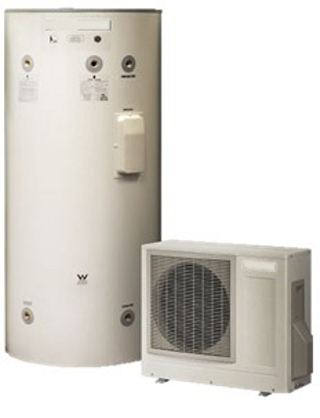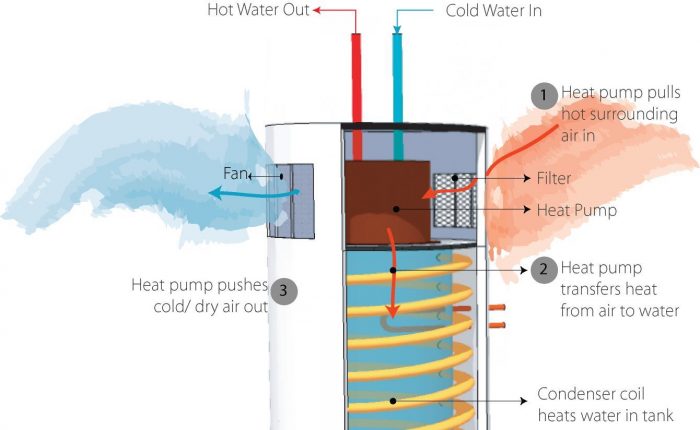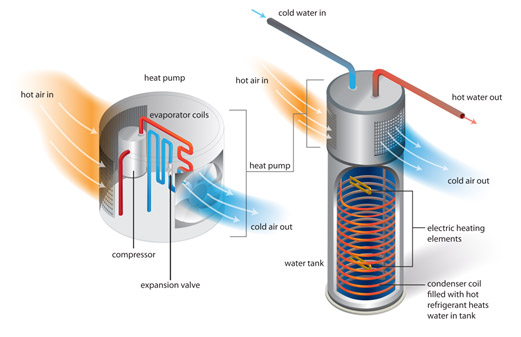Yes, heat pump water heaters can work in cold climates, but their efficiency may decrease. They require a minimum ambient temperature to operate effectively.
Heat pump water heaters are an energy-efficient alternative to traditional systems. They extract heat from the surrounding air to heat water, making them suitable for various climates. While cold temperatures can impact their efficiency, many modern models are designed to perform well even in chilly conditions.
Homeowners can benefit from lower energy bills and reduced carbon footprints. Understanding how these systems operate can help you make informed decisions about your water heating needs. With proper installation and maintenance, heat pump water heaters can be a reliable choice for year-round hot water.
Page Contents
- 1 Introduction To Heat Pump Water Heaters
- 2 Challenges In Cold Climates
- 3 Technological Adaptations For Cold Weather
- 4 Performance Metrics In The Cold
- 5 Case Studies
- 6 Installation Considerations
- 7 Cost-benefit Analysis
- 8 Consumer Experiences
- 9 The Future Of Heat Pump Water Heaters In Cold Zones
- 10 Conclusion
Introduction To Heat Pump Water Heaters
Heat pump water heaters use electricity to move heat from one place to another. They take heat from the air or ground and transfer it to water. This method is very efficient, especially compared to traditional water heaters.
Traditional water heaters generate heat directly. They use gas or electricity to warm the water. This process can be costly and less energy-efficient. In contrast, heat pump water heaters can save money on energy bills.
| Feature | Heat Pump Water Heaters | Traditional Water Heaters |
|---|---|---|
| Energy Efficiency | High | Low |
| Operating Cost | Lower | Higher |
| Heat Source | Air/Ground | Gas/Electricity |

Credit: www.energystar.gov
Challenges In Cold Climates
Heat pump water heaters face challenges in cold climates. Low temperatures can reduce their efficiency. These systems rely on outside air for heat. In colder areas, this air is less effective.
Frost can form on the unit. This frost can block airflow and lower performance. Regular maintenance is essential to prevent these issues. Keeping the unit clean helps improve efficiency.
Some homeowners may need to install additional heating systems. This ensures hot water availability during extreme cold. Understanding these factors helps in making better decisions.
Technological Adaptations For Cold Weather
Heat pump water heaters are designed to work efficiently in cold climates. New advancements have improved their performance in chilly conditions. For instance, modern heat pumps can operate at lower temperatures. This ensures they remain effective even when it’s very cold outside.
Many heat pumps now include integrated heating elements. These elements help boost water temperature during extreme cold. This feature allows the heat pump to work better with existing systems. Homeowners can enjoy consistent hot water without interruptions.
| Advancements | Benefits |
|---|---|
| Improved insulation | Reduces energy loss |
| Variable speed compressors | Increases efficiency |
| Smart controls | Enhances user experience |
Performance Metrics In The Cold
Heat pump water heaters can still be effective in cold climates. Their performance depends on various metrics. One key metric is the Coefficient of Performance (COP). This measures efficiency. A higher COP means better performance. In cold weather, COP may decrease, but it can still be useful.
Energy consumption patterns also play a role. During colder months, these systems may use more energy. They extract heat from the outside air. Even in cold temperatures, there is some heat available. Understanding these patterns helps in planning energy use.
| Performance Metric | Typical Value |
|---|---|
| COP in Mild Weather | 3.0 – 4.0 |
| COP in Cold Weather | 2.0 – 3.0 |
| Energy Use Increase | 15% – 25% |
Case Studies
Heat pump water heaters can work well in cold climates. Case studies show their long-term performance is effective even in frigid zones. For example, homes in Minnesota reported consistent hot water throughout the winter.
Another case in Alaska showed these systems using less energy than traditional heaters. Residents enjoyed lower electricity bills while still having reliable hot water. Performance varied slightly, but overall satisfaction remained high.
| Location | Temperature Range | Performance Rating |
|---|---|---|
| Minnesota | -10°F to 30°F | Excellent |
| Alaska | -20°F to 25°F | Good |
| North Dakota | -15°F to 35°F | Very Good |

Credit: www.greenbuildingadvisor.com
Installation Considerations
Choosing the right size for a heat pump water heater is important. It affects efficiency and performance. Ensure the unit matches your household’s hot water needs.
Placement matters too. Install the heater in a protected area with good airflow. Avoid spots prone to extreme cold or drafts. This helps the heater work better.
Proper insulation is key for cold climates. Insulate hot water pipes to reduce heat loss. Weatherproofing the installation area keeps it warm.
| Consideration | Importance |
|---|---|
| Sizing | Ensures efficiency and meets hot water needs |
| Placement | Affects performance and efficiency |
| Insulation | Reduces heat loss and improves efficiency |
| Weatherproofing | Keeps the heater functioning in cold conditions |
Cost-benefit Analysis
The initial investment for a heat pump water heater can be higher than traditional systems. Costs typically range from $1,000 to $3,000. Yet, long-term savings can be significant. Users may save $300 to $600 annually on energy bills. This savings helps offset the initial cost over time.
Many regions offer incentives and rebates for energy-efficient products. These can reduce the purchase price significantly. Check local programs for available financial assistance. This can make the investment even more appealing.
| Cost-Benefit Aspect | Details |
|---|---|
| Initial Investment | $1,000 to $3,000 |
| Annual Savings | $300 to $600 |
| Incentives | Local rebates and financial assistance |
Consumer Experiences
Many users report high satisfaction with heat pump water heaters in cold areas. They notice lower energy bills and reliable hot water supply. However, some users mention slower recovery times in extreme cold.
Feedback often highlights the importance of proper installation. Ensuring the unit is well-placed can improve performance. Regular maintenance helps keep the system efficient.
| Tip | Description |
|---|---|
| Location | Install in a well-insulated space to maximize efficiency. |
| Temperature | Set the thermostat to a suitable temperature for best performance. |
| Maintenance | Check filters and clean coils regularly for optimal function. |
The Future Of Heat Pump Water Heaters In Cold Zones
Heat pump water heaters are becoming popular in cold climates. Emerging technologies improve their efficiency in low temperatures. These units can now operate effectively in freezing conditions.
Recent innovations include improved insulation and advanced compressors. These features help maintain performance even in extreme cold. Smart controls allow users to monitor and adjust settings remotely.
Market trends show a growing demand for eco-friendly solutions. Government incentives support the adoption of heat pump water heaters. This shift encourages homeowners to choose these systems over traditional options.
| Technology | Benefits |
|---|---|
| Improved Insulation | Increases efficiency in low temperatures |
| Advanced Compressors | Enhances performance in cold weather |
| Smart Controls | Allows remote monitoring and adjustment |

Credit: gskclimatecontrol.com
Conclusion
Heat pump water heaters can be effective in cold climates with the right conditions. They utilize ambient air to heat water efficiently. Choosing a model designed for low temperatures is crucial. Proper installation and maintenance also enhance performance. Overall, these systems offer a sustainable solution for homes in chilly regions.
